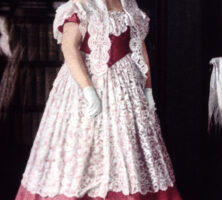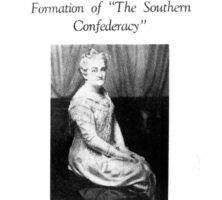Mildred Lewis Rutherford is best known for her Confederate memorial activities and for her books on the South.
She wrote twenty-nine widely read books and pamphlets, including The South in History and Literature (1907); What the South May Claim; or, Where the South Leads (1916); King Cotton: The True History of Cotton and the Cotton Gin (1922); and The South Must Have Her Rightful Place in History (1923). For three years (1923-26) she also published Miss Rutherford’s Scrap Book, a monthly periodical. In addition to writing, Rutherford lectured widely at Confederate Memorial Day celebrations and at United Confederate Veterans and United Daughters of the Confederacy (UDC) engagements.
Rutherford was born in Athens on July 16, 1851, into a wealthy patrician family with deep roots. Prior to the Civil War (1861-65), her father, Williams Rutherford, and her maternal uncles, Howell Cobb and Thomas R. R. Cobb, were among the state’s slave-owning elite. Rutherford attended the Lucy Cobb Institute, a finishing school for girls in Athens, and after graduating in 1868, she taught history and literature in Atlanta. In 1880 she returned to Athens and became the principal of the Lucy Cobb Institute.

A tireless advocate of the “Lost Cause” version of southern history, Rutherford served as the president of the Georgia division of the UDC from 1899 to 1902, and as the historian general of the national organization from 1911 to 1916. Within the Georgia division, Rutherford promoted educational work in Appalachian Georgia and advocated the use of UDC funds for building facilities at the Rabun Gap-Nacoochee School . She also served as a vice president of the Stone Mountain monument project.
During a time of shifting gender roles, Rutherford harkened back to “Old South” ideals about a woman’s proper sphere. Although she defied conventional female behavior both by becoming a public speaker and by remaining unmarried throughout her life, she publicly advocated traditional societal roles for women. She joined the Georgia Association Opposed to Woman Suffrage in 1914 and remained a vocal opponent of woman suffrage and of the Nineteenth Amendment until its ratification in 1920.
Rutherford fell ill in 1927. Late on the night of December 25, while she was convalescing, her house caught fire, and many of her personal papers and belongings were burned. She died the following year, on August 15, 1928. Mildred Seydell, her great niece, was named in Rutherford’s honor and became a prominent journalist.








